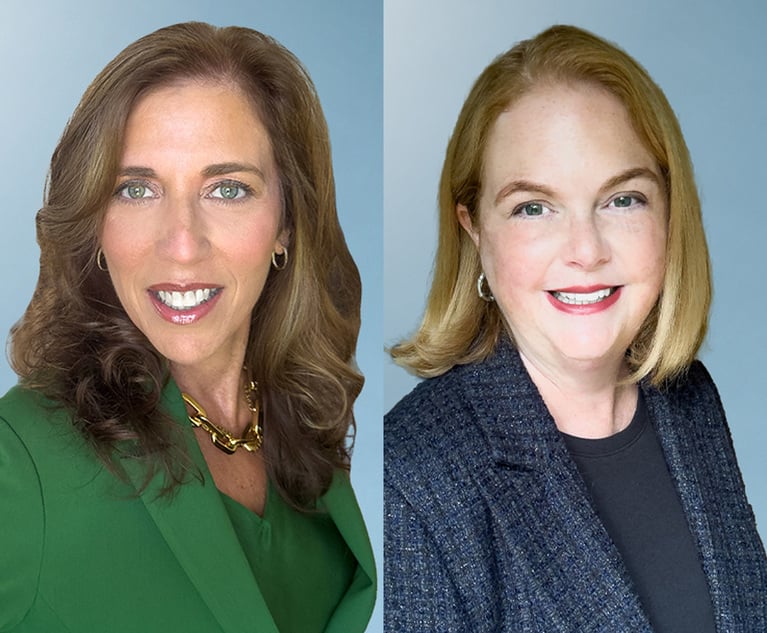 Wildfire in California.
Wildfire in California.Wildfires Teach Valuable Lessons on Law Firm Disaster Preparedness
"Lawyers are professionals and have obligations to their clients that others don't," said one professional liability lawyer.
December 10, 2018 at 09:00 AM
6 minute read
The original version of this story was published on Legal Tech News
Law offices were not spared from the recent California wildfires which resulted in massive destruction and led to the deaths of some 85 residents. Lawyers in Paradise, Malibu and even Chico report facing diverse challenges from the wildfires, based on interviews and online information.
For instance, one Paradise attorney, Christian Atherton, who has practiced in the community for 23 years, announced on his website that the wildfire “destroyed our office.”
“Regardless, we remain available to assist with your needs via telephone and temporary office space during the rebuilding process,” he informed his clients.
The wildfires even had limited impact on offices in nearby cities. For instance, Mark Habib, an attorney at Peters, Habib, McKenna, Juhl-Rhodes & Cardoza, located in Chico, told The Recorder affiliate Legaltech News, “We were only impacted by smoke and working conditions that limited certain personnel from putting in full, productive workdays.”
Fortunately, the firm did not experience “downtime in the function of our building or computer operations,” Habib said.
However, in Malibu, Steven Weinberg, an attorney at Holmes Weinberg, said they were forced to leave their office for two and a half weeks, given that their office is “located in one of the areas most heavily damaged by the fires.”
A generator helped protect their office. “We were very lucky that we have a significant generator that works when electricity is cut off. And two neighbors who didn't evacuate and were first responders to local fires used our offices, which had internet and electricity, as their base and put out fires on our property, which otherwise would have destroyed … [our] offices,” he said.
Well before the wildfire, the Malibu office was already largely “a virtual firm and almost paperless,” Weinberg said. That helped when working off-site.
“We all had to work remotely. We moved our master server, which contains all of our files and noncloud-based apps, to my friend's law office in Beverly Hills during the first weekend of the fires, and were up and running by the end of Sunday,” Weinberg recalled. “Before we evacuated, we made sure everyone had all the files they needed while we were transitioning, and then we sent any files anyone requested through Outlook through Sharefile until we set up gotomypc access.”
“Many of our apps already are in the cloud,” Weinberg said. “During the usual course of business, our folks access the server through gotomypc. Basically, once we set everything up from the new location, it was business as usual.”
|The Disaster Plan
Looking at the bigger picture, the wildfires show that law firms need to prepare for disasters ahead of time. Professionals recommend having a disaster recovery plan in place.
Joseph Lazzarotti, an attorney at Jackson Lewis, explained that law firms “likely have significant legal and contractual obligations when facing disasters. And, unlike other businesses, law firms also have ethical and professional responsibilities with respect to their clients.”
Important in this is the American Bar Association Formal Opinion 482, relating to disasters.
“Lawyers are professionals and have obligations to their clients that others don't,” said Janis Meyer, an attorney with Hinshaw & Culbertson. She encouraged attorneys to review the new ABA opinion. “As a lawyer, you just can't run [away after a disaster]. … As lawyers, we can't just decide tomorrow we're no longer going to service a client.”
She said some of the highlights from the opinion require that lawyers communicate with clients, protect client records and property, and are able to get in touch with clients when there is a crisis.
Lazzarotti noted how Formal Opinion 482 says in part, “lawyers have an ethical obligation to implement reasonable measures to safeguard property and funds they hold for clients or third parties, prepare for business interruption, and keep clients informed about how to contact the lawyers (or their successor counsel). Lawyers also must follow the advertising rules if soliciting victims affected by a disaster.”
Additionally, after the disaster, lawyers may have to notify clients of the incident and the effects of their representation, Lazzarotti said. Moreover, laws may require firms to safeguard certain data pertaining to clients. One example Lazzarotti cites is when a firm represents a health care provider, which is subject to regulations under the Health Insurance Portability and Accountability Act of 1996 (HIPAA).
Clients also increasingly want law firms to agree to enhanced data security safeguards, Lazzarotti said. Enhanced agreements may lead to having a plan in place to safeguard the clients' data in case of a disaster.
Similarly, the State Bar of California recently issued some tips for attorneys to prepare for disasters. These include:
- Make sure property insurance covers client property, along with the cost of hiring temporary help to reconstruct files and billing systems;
- Maintain an off-site list of client names and contact information;
- Maintain an off-site list of cases, including case name, docket number, court, judge and opposing counsel;
- Maintain an off-site calendar for each case;
- Maintain off-site accounting records and billing information;
- Back up computer files, with one set stored off-site;
- Keep an inventory of client property and valuable office furnishings;
- Keep irreplaceable client property in a locked, watertight and fireproof safe or evidence locker; and
- Arrange for a designated attorney to administer a law practice in the event the lawyer becomes disabled or incapacitated through the State Bar Attorney Surrogacy program.
A word of warning: Attorneys must be cautious about running into the fray handing out business cards in a disaster; it is similar to ambulance chasing, Meyer said. But they can reach out to existing clients. So, if there is a disaster, and a solo practitioner sets up files in his or her garage at the house, Meyer said, he or she could then email clients to say: “I'm operating out of my house. Here is contact information if you need to reach me. And let me know if you need anything.”
If time is short, Jonathan Reed, CEO of AdvoLogix, said small firms still may want to make a transportable copy of calendars, contacts, dockets, scanning or packing existing work documents; sign up for a cloud-based document repository such as Box or Dropbox; and start a file sync so documents are accessible anywhere.
But he added that larger firms “must plan ahead, anticipating risks and making and practicing appropriate actions when disaster strikes.”
Read more:
This content has been archived. It is available through our partners, LexisNexis® and Bloomberg Law.
To view this content, please continue to their sites.
Not a Lexis Subscriber?
Subscribe Now
Not a Bloomberg Law Subscriber?
Subscribe Now
NOT FOR REPRINT
© 2024 ALM Global, LLC, All Rights Reserved. Request academic re-use from www.copyright.com. All other uses, submit a request to [email protected]. For more information visit Asset & Logo Licensing.
You Might Like
View All

Faegre Drinker Adds Three Former Federal Prosecutors From Greenberg Traurig
4 minute read
Anapol Weiss Acquires Boutique Led by Star Litigator Alexandra Walsh
5 minute read
Pierson Ferdinand Lures Veteran M&A Specialist From Sheppard Mullin in Silicon Valley
4 minute readTrending Stories
- 1On the Move and After Hours: Goldberg Segalla, Faegre Drinker, Pashman Stein
- 2Recent FTC Cases Against Auto Dealers Suggest Regulators Are Keeping Foot on Accelerator
- 3‘Not A Kindergarten Teacher’: Judge Blasts Keller Postman, Jenner & Block, in Mass Arb Dispute
- 4A&O Shearman, Hogan Lovells and the Stories That Shaped Africa This Year
- 5Borden Ladner Gervais Cyber Expert Warns of AI-Boosted Ransomware Attacks
Who Got The Work
Michael G. Bongiorno, Andrew Scott Dulberg and Elizabeth E. Driscoll from Wilmer Cutler Pickering Hale and Dorr have stepped in to represent Symbotic Inc., an A.I.-enabled technology platform that focuses on increasing supply chain efficiency, and other defendants in a pending shareholder derivative lawsuit. The case, filed Oct. 2 in Massachusetts District Court by the Brown Law Firm on behalf of Stephen Austen, accuses certain officers and directors of misleading investors in regard to Symbotic's potential for margin growth by failing to disclose that the company was not equipped to timely deploy its systems or manage expenses through project delays. The case, assigned to U.S. District Judge Nathaniel M. Gorton, is 1:24-cv-12522, Austen v. Cohen et al.
Who Got The Work
Edmund Polubinski and Marie Killmond of Davis Polk & Wardwell have entered appearances for data platform software development company MongoDB and other defendants in a pending shareholder derivative lawsuit. The action, filed Oct. 7 in New York Southern District Court by the Brown Law Firm, accuses the company's directors and/or officers of falsely expressing confidence in the company’s restructuring of its sales incentive plan and downplaying the severity of decreases in its upfront commitments. The case is 1:24-cv-07594, Roy v. Ittycheria et al.
Who Got The Work
Amy O. Bruchs and Kurt F. Ellison of Michael Best & Friedrich have entered appearances for Epic Systems Corp. in a pending employment discrimination lawsuit. The suit was filed Sept. 7 in Wisconsin Western District Court by Levine Eisberner LLC and Siri & Glimstad on behalf of a project manager who claims that he was wrongfully terminated after applying for a religious exemption to the defendant's COVID-19 vaccine mandate. The case, assigned to U.S. Magistrate Judge Anita Marie Boor, is 3:24-cv-00630, Secker, Nathan v. Epic Systems Corporation.
Who Got The Work
David X. Sullivan, Thomas J. Finn and Gregory A. Hall from McCarter & English have entered appearances for Sunrun Installation Services in a pending civil rights lawsuit. The complaint was filed Sept. 4 in Connecticut District Court by attorney Robert M. Berke on behalf of former employee George Edward Steins, who was arrested and charged with employing an unregistered home improvement salesperson. The complaint alleges that had Sunrun informed the Connecticut Department of Consumer Protection that the plaintiff's employment had ended in 2017 and that he no longer held Sunrun's home improvement contractor license, he would not have been hit with charges, which were dismissed in May 2024. The case, assigned to U.S. District Judge Jeffrey A. Meyer, is 3:24-cv-01423, Steins v. Sunrun, Inc. et al.
Who Got The Work
Greenberg Traurig shareholder Joshua L. Raskin has entered an appearance for boohoo.com UK Ltd. in a pending patent infringement lawsuit. The suit, filed Sept. 3 in Texas Eastern District Court by Rozier Hardt McDonough on behalf of Alto Dynamics, asserts five patents related to an online shopping platform. The case, assigned to U.S. District Judge Rodney Gilstrap, is 2:24-cv-00719, Alto Dynamics, LLC v. boohoo.com UK Limited.
Featured Firms
Law Offices of Gary Martin Hays & Associates, P.C.
(470) 294-1674
Law Offices of Mark E. Salomone
(857) 444-6468
Smith & Hassler
(713) 739-1250






